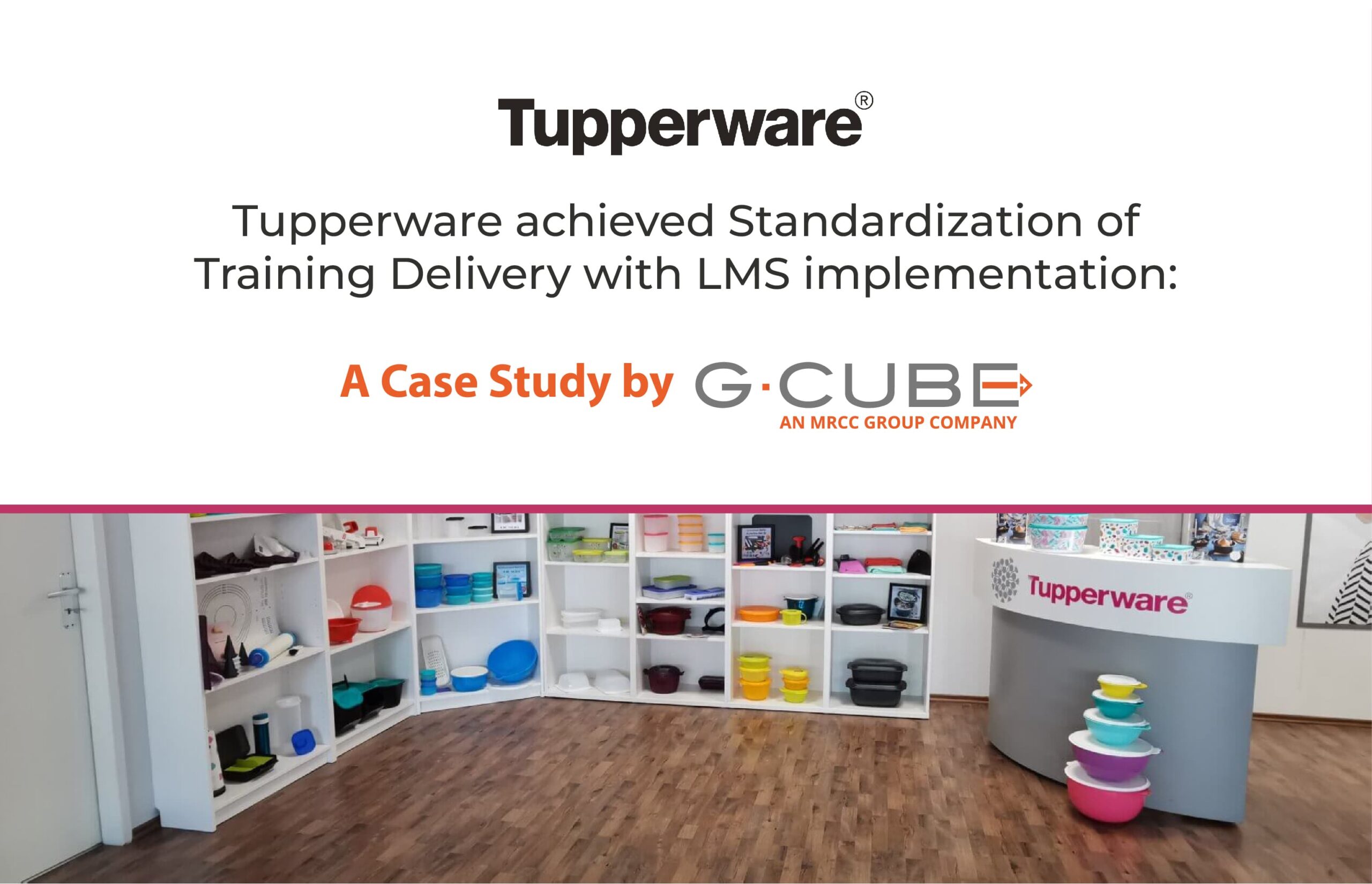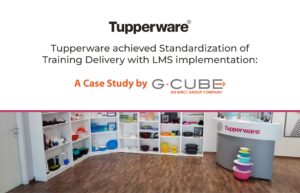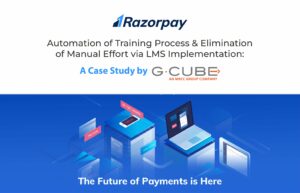
Tupperware achieved Standardization of Training Delivery with LMS implementation : A Case Study by G-Cube
Tupperware achieved Standardization of Training Delivery with LMS implementation : A Case Study by G-Cube
- Home
- Case Study
- Tupperware achieved Standardization of Training Delivery with LMS implementation
Share This Post
Share This Post
Latest Case Studies

Overview
- Client :
- Tupperware is a home products line that includes preparation, storage, and serving products for the kitchen and home. Tupperware develops, manufactures, and internationally distributes its products as a wholly owned subsidiary of its parent company Tupperware Brands. They mainly use a multi-level marketing model for their primary mode of sales. The client has always led their business with a “people & planet first” approach, which has brought them continuous growth and success.
- Category :
- LMS
- Industry :
- FMCG
Top Highlights
- Standardized training delivery to all employees at exclusive retail stores spread across geographies.
- Faster onboarding process, feedback mechanism for new hires with quick knowledge transfer.
- Elimination of manual efforts involved in training administration activities that saved cost and time.
Business Requirement
Tupperware was using demo videos of their range of home products for training purposes and sharing them with their employees, and partners. The training approach adopted wasn’t that much feasible due to being more time-consuming and lack of standardization. The client was looking to scale up their business model by setting up multiple exclusive retail stores across geographies, thus they needed an online platform to fulfill training administration requirements as being done manually. They aimed to ensure that the same set of customer experiences gets delivered to the consumers across multiple retail stores.
When they approached G-Cube to find a digital learning solution, the requirements were very specific regards to managing the onboarding activities of new hires, meeting end-to-end training needs of workforces at the retail stores, and tracking all training-related data. The client’s requirements included –
- 1. A centralized system to standardize training delivery across multiple channels such as retail & franchise stores, home shops, and web stores.
- 2. A Mobile-based platform that enables the workforce to learn with ease anywhere, anytime learning.
- 3. To build a repository of all training-related documents and automate the overall training administration process that saves both cost and time.
- 4. An easy way to transfer knowledge to employees that includes product information, product sales pitches, and demo videos of new product launches or new features added to the existing home products range.
Tupperware’s management team with the vision to scale up their existing business model had to take care of their employee’s product knowledge and soft skills training. There were multiple challenges as their ongoing training practices were handled manually and that needed to be addressed.
- Non- availability of any tracking mechanism to keep a check on training needs identification and other requirements to upskill their workforce.
- All training administration process was handled manually using excel spreadsheets, thus more time consuming and more chances of error rate.
- Delays in delivering training to employees due to the non-availability of a centralized repository containing training materials.
- More time consumed in knowledge transfer to the employees such as product training, soft skills, and customer handling skills training.
- Unable to deliver seamless customer experience to consumers across multiple retail stores.
- LMS is implemented both as a web application and Mobile App. There are two interfaces – the ‘Learner’ and the ‘Administrator’ interface with different rights provided to each level.
- The Mobile App LMS provided a primary solution to the client that enabled their workforce with the flexibility to complete their learning on the go.
- User Management functionality – managing user attributes, handling archived users, deleted users, logged-in users, managing job roles, and managing training groups.
- The system provided a built-in Social & Collaborative learning feature called the ‘Active Wall’. This helped to drive social learning and a spirit of collaboration among the employees.
- Gamification mode – for the users to learn in a competitive environment. Users can access Leaderboard to see their rank among their peers and view badges, coins, or points earned.
- Certificate management – learners are awarded a certificate once their training program is completed.
- Reporting & Dashboards – these are standard reports & dashboards which can be easily accessed by managers or LMS administrators.
- “Help & Support” section – This comprises FAQs, Contact Us, and a Help Manual with all details configurable by the administrator.
Impact
- Making new home product launches more effective and efficient.
- Increase in customer experience with the same set of information being delivered to the consumers.
- Achieve On-demand learning and On-the-go learning for the dispersed workforce.
- LMS enabled real-time improvements, a reduction in time taken for new hires joining formalities.

Overview
- Client :
- Tupperware is a home products line that includes preparation, storage, and serving products for the kitchen and home. Tupperware develops, manufactures, and internationally distributes its products as a wholly owned subsidiary of its parent company Tupperware Brands. They mainly use a multi-level marketing model for their primary mode of sales. The client has always led their business with a “people & planet first” approach, which has brought them continuous growth and success.
- Category :
- LMS
- Industry :
- FMCG
Top Highlights
- Standardized training delivery to all employees at exclusive retail stores spread across geographies.
- Faster onboarding process, feedback mechanism for new hires with quick knowledge transfer.
- Elimination of manual efforts involved in training administration activities that saved cost and time.
Business Requirement
Tupperware was using demo videos of their range of home products for training purposes and sharing them with their employees, and partners. The training approach adopted wasn’t that much feasible due to being more time-consuming and lack of standardization. The client was looking to scale up their business model by setting up multiple exclusive retail stores across geographies, thus they needed an online platform to fulfill training administration requirements as being done manually. They aimed to ensure that the same set of customer experiences gets delivered to the consumers across multiple retail stores.
When they approached G-Cube to find a digital learning solution, the requirements were very specific regards to managing the onboarding activities of new hires, meeting end-to-end training needs of workforces at the retail stores, and tracking all training-related data. The client’s requirements included –
- 1. A centralized system to standardize training delivery across multiple channels such as retail & franchise stores, home shops, and web stores.
- 2. A Mobile-based platform that enables the workforce to learn with ease anywhere, anytime learning.
- 3. To build a repository of all training-related documents and automate the overall training administration process that saves both cost and time.
- 4. An easy way to transfer knowledge to employees that includes product information, product sales pitches, and demo videos of new product launches or new features added to the existing home products range.
Tupperware’s management team with the vision to scale up their existing business model had to take care of their employee’s product knowledge and soft skills training. There were multiple challenges as their ongoing training practices were handled manually and that needed to be addressed.
- Non- availability of any tracking mechanism to keep a check on training needs identification and other requirements to upskill their workforce.
- All training administration process was handled manually using excel spreadsheets, thus more time consuming and more chances of error rate.
- Delays in delivering training to employees due to the non-availability of a centralized repository containing training materials.
- More time consumed in knowledge transfer to the employees such as product training, soft skills, and customer handling skills training.
- Unable to deliver seamless customer experience to consumers across multiple retail stores.
- LMS is implemented both as a web application and Mobile App. There are two interfaces – the ‘Learner’ and the ‘Administrator’ interface with different rights provided to each level.
- The Mobile App LMS provided a primary solution to the client that enabled their workforce with the flexibility to complete their learning on the go.
- User Management functionality – managing user attributes, handling archived users, deleted users, logged-in users, managing job roles, and managing training groups.
- The system provided a built-in Social & Collaborative learning feature called the ‘Active Wall’. This helped to drive social learning and a spirit of collaboration among the employees.
- Gamification mode – for the users to learn in a competitive environment. Users can access Leaderboard to see their rank among their peers and view badges, coins, or points earned.
- Certificate management – learners are awarded a certificate once their training program is completed.
- Reporting & Dashboards – these are standard reports & dashboards which can be easily accessed by managers or LMS administrators.
- “Help & Support” section – This comprises FAQs, Contact Us, and a Help Manual with all details configurable by the administrator.
Impact
- Making new home product launches more effective and efficient.
- Increase in customer experience with the same set of information being delivered to the consumers.
- Achieve On-demand learning and On-the-go learning for the dispersed workforce.
- LMS enabled real-time improvements, a reduction in time taken for new hires joining formalities.







